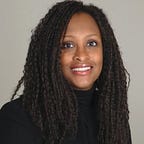“You may be the first, but make sure you are not the last.”
There has rarely been in a time in my life where I was not the only- the only female, the only black girl, the only me. Except for visits to family in Trinidad, I have never been in the majority. When I was younger, my parents would say it was because I was so special, I had the opportunity to represent myself, my family and make room for little girls and boys who looked like me. Today, I still find myself walking into conference rooms, public spaces and seeing who looks like me and what they do.
I used to get angry and wonder why I had the obligation to represent my entire race when others could fail or excel without the extra burden of gender and race. I would question why my responsibility seemed so much more than others but as I’ve gotten older and raise my equally talented and beautiful black daughter, I’ve decided to own my power. There is a power in being the first, being the only. The power is not in the singular experience, the power comes from owning your space and most importantly, opening the door, expanding the conversation and the narrative.
The statistics can be disheartening for a black woman in the non-profit space. 90% of nonprofits are led by white people. Whites fill nine out of 10 board chair and CEO positions at nonprofits nationwide. Moreover, this dichotomy in leadership, often cements institutional and implicit bias that maintains an unbalanced power dynamic between funders and grantees. Executive leadership negates the statistics that black Americans are most likely to have attained post-secondary education. And while Black women only make up 12.7% of the female population in the country, they consistently make up over 50% of the number of Black people who receive postsecondary degrees.
Therefore, the trope that there are not enough educated minorities for executive leadership is invalid and disingenuous. The reality is that the executive leadership of nonprofits very rarely reflect the communities within which they work. However, we all have a responsibility to change these statistics.
The importance of diversity is more than the need for greater representation but creating an opportunity for all voices to be heard, valued, understood, and learned from. The riots at our Capitol, the deaths of Ahmed Arbery, George Floyd, Toyin Salu, and the countless unnamed and ignored by history, illustrate the need for more spaces to have conversations and confront the darkness in our psyches. This bias does not magically end in the boardroom or in the workplace. We must confront our own self-narratives and address the bias and discrimination in our families, friends, and ourselves. When people are able to ask questions, be confronted about their biases, and we all have them, we then create a space for growth. This growth is challenging, frustrating, and can be aggravating but sorely needed. It’s not about light driving out the darkness but a commitment, that is not performative, to equity for all. A call to action that does not ask the aggrieved to be silent or accommodating but to be heard and treated as equally as their peers. So no one will have to receive comments, like the microaggressions that I have heard over a lifetime, expressing shock over my education, or that my parents were married or how articulate I am. Rather than I will be valued for the sum of my experiences and not minimized by the expectations made not of my creation.
As Audre Lorde wrote, “We have been taught that silence would save us. It won’t.”
